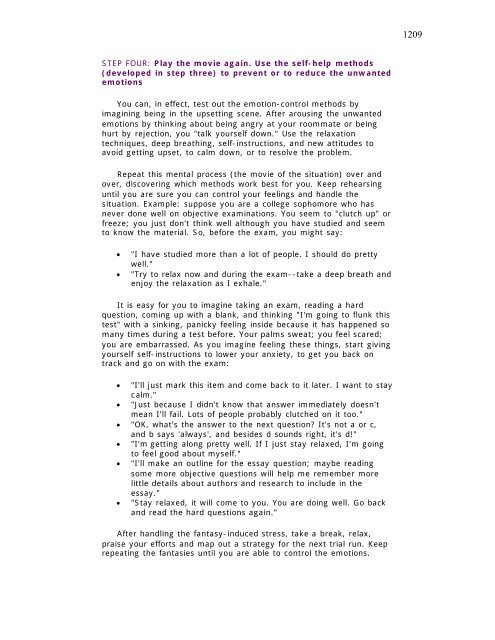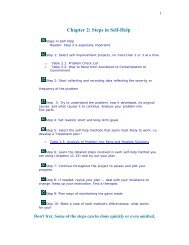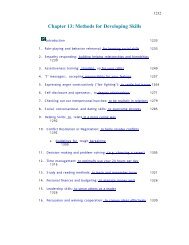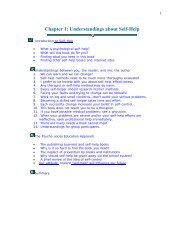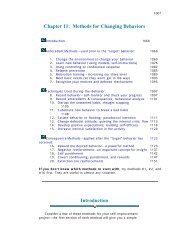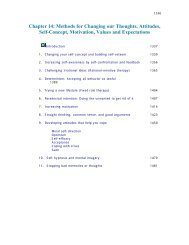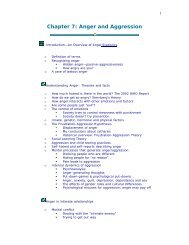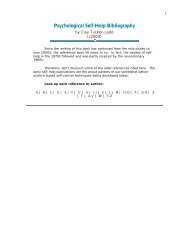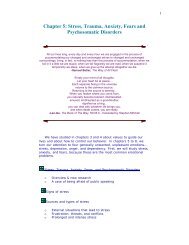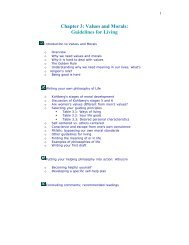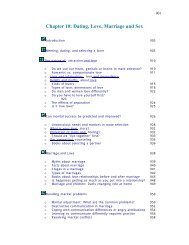Chapter 12: Methods for Changing Emotions - Psychological Self-Help
Chapter 12: Methods for Changing Emotions - Psychological Self-Help
Chapter 12: Methods for Changing Emotions - Psychological Self-Help
You also want an ePaper? Increase the reach of your titles
YUMPU automatically turns print PDFs into web optimized ePapers that Google loves.
<strong>12</strong>09<br />
STEP FOUR: Play the movie again. Use the self-help methods<br />
(developed in step three) to prevent or to reduce the unwanted<br />
emotions<br />
You can, in effect, test out the emotion-control methods by<br />
imagining being in the upsetting scene. After arousing the unwanted<br />
emotions by thinking about being angry at your roommate or being<br />
hurt by rejection, you "talk yourself down." Use the relaxation<br />
techniques, deep breathing, self-instructions, and new attitudes to<br />
avoid getting upset, to calm down, or to resolve the problem.<br />
Repeat this mental process (the movie of the situation) over and<br />
over, discovering which methods work best <strong>for</strong> you. Keep rehearsing<br />
until you are sure you can control your feelings and handle the<br />
situation. Example: suppose you are a college sophomore who has<br />
never done well on objective examinations. You seem to "clutch up" or<br />
freeze; you just don't think well although you have studied and seem<br />
to know the material. So, be<strong>for</strong>e the exam, you might say:<br />
· "I have studied more than a lot of people. I should do pretty<br />
well."<br />
· "Try to relax now and during the exam--take a deep breath and<br />
enjoy the relaxation as I exhale."<br />
It is easy <strong>for</strong> you to imagine taking an exam, reading a hard<br />
question, coming up with a blank, and thinking "I'm going to flunk this<br />
test" with a sinking, panicky feeling inside because it has happened so<br />
many times during a test be<strong>for</strong>e. Your palms sweat; you feel scared;<br />
you are embarrassed. As you imagine feeling these things, start giving<br />
yourself self-instructions to lower your anxiety, to get you back on<br />
track and go on with the exam:<br />
· "I'll just mark this item and come back to it later. I want to stay<br />
calm."<br />
· "Just because I didn't know that answer immediately doesn't<br />
mean I'll fail. Lots of people probably clutched on it too."<br />
· "OK, what's the answer to the next question? It's not a or c,<br />
and b says 'always', and besides d sounds right, it's d!"<br />
· "I'm getting along pretty well. If I just stay relaxed, I'm going<br />
to feel good about myself."<br />
· "I'll make an outline <strong>for</strong> the essay question; maybe reading<br />
some more objective questions will help me remember more<br />
little details about authors and research to include in the<br />
essay."<br />
· "Stay relaxed, it will come to you. You are doing well. Go back<br />
and read the hard questions again."<br />
After handling the fantasy-induced stress, take a break, relax,<br />
praise your ef<strong>for</strong>ts and map out a strategy <strong>for</strong> the next trial run. Keep<br />
repeating the fantasies until you are able to control the emotions.


